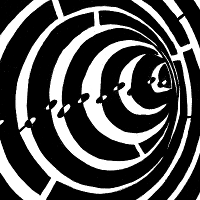Published: march 23, 2003; The New York Times Magazine. Paul Berman is the author of the book ”Terror and Liberalism” (W.W. Norton), from which this essay (republished in 3 parts) is adapted. You can read part 2 here en part 3 here.
by Paul Berman
In the days after Sept. 11, 2001, many people anticipated a quick and satisfying American victory over Al Qaeda. The terrorist army was thought to be no bigger than a pirate ship, and the newly vigilant police forces of the entire world were going to sink the ship with swift arrests and dark maneuvers. Al Qaeda was driven from its bases in Afghanistan. Arrests and maneuvers duly occurred and are still occurring. Just this month, one of Osama bin Laden’s top lieutenants was nabbed in Pakistan. Police agents, as I write, seem to be hot on the trail of bin Laden himself, or so reports suggest.
Yet Al Qaeda has seemed unfazed. Its popularity, which was hard to imagine at first, has turned out to be large and genuine in more than a few countries. Al Qaeda upholds a paranoid and apocalyptic worldview, according to which ”Crusaders and Zionists” have been conspiring for centuries to destroy Islam. And this worldview turns out to be widely accepted in many places — a worldview that allowed many millions of people to regard the Sept. 11 attacks as an Israeli conspiracy, or perhaps a C.I.A. conspiracy, to undo Islam. Bin Laden’s soulful, bearded face peers out from T-shirts and posters in a number of countries, quite as if he were the new Che Guevara, the mythic righter of cosmic wrongs.
The vigilant police in many countries, applying themselves at last, have raided a number of Muslim charities and Islamic banks, which stand accused of subsidizing the terrorists. These raids have advanced the war on still another front, which has been good to see. But the raids have also shown that Al Qaeda is not only popular; it is also institutionally solid, with a worldwide network of clandestine resources. This is not the Symbionese Liberation Army. This is an organization with ties to the ruling elites in a number of countries; an organization that, were it given the chance to strike up an alliance with Saddam Hussein’s Baath movement, would be doubly terrifying; an organization that, in any case, will surely survive the outcome in Iraq.
To anyone who has looked closely enough, Al Qaeda and its sister organizations plainly enjoy yet another strength, arguably the greatest strength of all, something truly imposing — though in the Western press this final strength has received very little attention. Bin Laden is a Saudi plutocrat with Yemeni ancestors, and most of the suicide warriors of Sept. 11 were likewise Saudis, and the provenance of those people has focused everyone’s attention on the Arabian peninsula. But Al Qaeda has broader roots. The organization was created in the late 1980’s by an affiliation of three armed factions — bin Laden’s circle of ”Afghan” Arabs, together with two factions from Egypt, the Islamic Group and Egyptian Islamic Jihad, the latter led by Dr. Ayman al-Zawahiri, Al Qaeda’s top theoretician. The Egyptian factions emerged from an older current, a school of thought from within Egypt’s fundamentalist movement, the Muslim Brotherhood, in the 1950’s and 60’s. And at the heart of that single school of thought stood, until his execution in 1966, a philosopher named Sayyid Qutb — the intellectual hero of every one of the groups that eventually went into Al Qaeda, their Karl Marx (to put it that way), their guide.
Qutb (pronounced KUH-tahb) wrote a book called ”Milestones,” and that book was cited at his trial, which gave it immense publicity, especially after its author was hanged. ”Milestones” became a classic manifesto of the terrorist wing of Islamic fundamentalism. A number of journalists have dutifully turned the pages of ”Milestones,” trying to decipher the otherwise inscrutable terrorist point of view.
I have been reading some of Qutb’s other books, and I think that ”Milestones” may have misled the journalists. ”Milestones” is a fairly shallow book, judged in isolation. But ”Milestones” was drawn from his vast commentary on the Koran called ”In the Shade of the Qur’an.” One of the many volumes of this giant work was translated into English in the 1970’s and published by the World Assembly of Muslim Youth, an organization later widely suspected of participation in terrorist attacks — and an organization whose Washington office was run by a brother of bin Laden’s. In the last four years a big effort has been mounted by another organization, the Islamic Foundation in England, to bring out the rest, in what will eventually be an edition of 15 fat English-language volumes, handsomely ornamented with Arabic script from the Koran. Just in these past few weeks a number of new volumes in this edition have made their way into the Arab bookshops of Brooklyn, and I have gobbled them up. By now I have made my way through a little less than half of ”In the Shade of the Qur’an,” which I think is all that exists so far in English, together with three other books by Qutb. And I have something to report.
Qutb is not shallow. Qutb is deep. ”In the Shade of the Qur’an” is, in its fashion, a masterwork. Al Qaeda and its sister organizations are not merely popular, wealthy, global, well connected and institutionally sophisticated. These groups stand on a set of ideas too, and some of those ideas may be pathological, which is an old story in modern politics; yet even so, the ideas are powerful. We should have known that, of course. But we should have known many things.
Qutb’s special ability as a writer came from the fact that, as a young boy, he received a traditional Muslim education — he committed the Koran to memory by the age of 10 — yet he went on, at a college in Cairo, to receive a modern, secular education. He was born in 1906, and in the 1920’s and 30’s he took up socialism and literature. He wrote novels, poems and a book that is still said to be well regarded called ”Literary Criticism: Its Principles and Methodology.” His writings reflected — here I quote one of his admirers and translators, Hamid Algar of the University of California at Berkeley — a ”Western-tinged outlook on cultural and literary questions.” Qutb displayed ”traces of individualism and existentialism.” He even traveled to the United States in the late 1940’s, enrolled at the Colorado State College of Education and earned a master’s degree. In some of the accounts of Qutb’s life, this trip to America is pictured as a ghastly trauma, mostly because of America’s sexual freedoms, which sent him reeling back to Egypt in a mood of hatred and fear.
I am skeptical of that interpretation, though. His book from the 1940’s, ”Social Justice and Islam,” shows that, even before his voyage to America, he was pretty well set in his Islamic fundamentalism. It is true that, after his return to Egypt, he veered into ever more radical directions. But in the early 1950’s, everyone in Egypt was veering in radical directions. Gamal Abdel Nasser and a group of nationalist army officers overthrew the old king in 1952 and launched a nationalist revolution on Pan-Arabist grounds. And, as the Pan-Arabists went about promoting their revolution, Sayyid Qutb went about promoting his own, somewhat different revolution. His idea was ”Islamist.” He wanted to turn Islam into a political movement to create a new society, to be based on ancient Koranic principles. Qutb joined the Muslim Brotherhood, became the editor of its journal and established himself right away as Islamism’s principal theoretician in the Arab world.
The Islamists and the Pan-Arabists tried to cooperate with one another in Egypt in those days, and there was some basis for doing so. Both movements dreamed of rescuing the Arab world from the legacies of European imperialism. Both groups dreamed of crushing Zionism and the brand-new Jewish state. Both groups dreamed of fashioning a new kind of modernity, which was not going to be liberal and freethinking in the Western style but, even so, was going to be up-to-date on economic and scientific issues. And both movements dreamed of doing all this by returning in some fashion to the glories of the Arab past. Both movements wanted to resurrect, in a modern version, the ancient Islamic caliphate of the seventh century, when the Arabs were conquering the world.
The Islamists and the Pan-Arabists could be compared, in these ambitions, with the Italian Fascists of Mussolini’s time, who wanted to resurrect the Roman Empire, and to the Nazis, who likewise wanted to resurrect ancient Rome, except in a German version. The most radical of the Pan-Arabists openly admired the Nazis and pictured their proposed new caliphate as a racial victory of the Arabs over all other ethnic groups. Qutb and the Islamists, by way of contrast, pictured the resurrected caliphate as a theocracy, strictly enforcing shariah, the legal code of the Koran. The Islamists and the Pan-Arabists had their similarities then, and their differences. (And today those two movements still have their similarities and differences — as shown by bin Laden’s Qaeda, which represents the most violent wing of Islamism, and Saddam Hussein’s Baath Party, which represents the most violent wing of Pan-Arabism.)
In 1952, in the days before staging his coup d’etat, Colonel Nasser is said to have paid a visit to Qutb at his home, presumably to get his backing. Some people expected that, after taking power, Nasser would appoint Qutb to be the new revolutionary minister of education. But once the Pan-Arabists had thrown out the old king, the differences between the two movements began to overwhelm the similarities, and Qutb was not appointed. Instead, Nasser cracked down on the Muslim Brotherhood, and after someone tried to assassinate him, he blamed the Brotherhood and cracked down even harder. Some of the Muslim Brotherhood’s most distinguished intellectuals and theologians escaped into exile. Sayyid Qutb’s brother, Muhammad Qutb, was one of those people. He fled to Saudi Arabia and ended up as a distinguished Saudi professor of Islamic Studies. Many years later, Osama bin Laden would be one of Muhammad Qutb’s students.
But Sayyid Qutb stayed put and paid dearly for his stubbornness. Nasser jailed him in 1954, briefly released him, jailed him again for 10 years, released him for a few months and finally hanged him in 1966. Conditions during the first years of prison were especially bad. Qutb was tortured. Even in better times, according to his followers, he was locked in a ward with 40 people, most of them criminals, with a tape recorder broadcasting the speeches of Nasser 20 hours a day. Still, by smuggling papers in and out of jail, he managed to continue with his writings, no longer in the ”Western tinged” vein of his early, literary days but now as a full-fledged Islamist revolutionary. And somehow, he produced his ”In the Shade of the Qur’an,” this gigantic study, which must surely count as one of the most remarkable works of prison literature ever produced.
Readers without a Muslim education who try to make their way unaided through the Koran tend to find it, as I have, a little dry and forbidding. But Qutb’s commentaries are not at all like that. He quotes passages from the chapters, or suras, of the Koran, and he pores over the quoted passages, observing the prosodic qualities of the text, the rhythm, tone and musicality of the words, sometimes the images. The suras lead him to discuss dietary regulations, the proper direction to pray, the rules of divorce, the question of when a man may propose marriage to a widow (four months and 10 days after the death of her husband, unless she is pregnant, in which case after delivery), the rules concerning a Muslim man who wishes to marry a Christian or a Jew (very complicated), the obligations of charity, the punishment for crimes and for breaking your word, the prohibition on liquor and intoxicants, the proper clothing to wear, the rules on usury, moneylending and a thousand other themes.
The Koran tells stories, and Qutb recounts some of these and remarks on their wisdom and significance. His tone is always lucid and plain. Yet the total effect of his writing is almost sensual in its measured pace. The very title ”In the Shade of the Qur’an” conveys a vivid desert image, as if the Koran were a leafy palm tree, and we have only to open Qutb’s pages to escape the hot sun and refresh ourselves in the shade. As he makes his way through the suras and proposes his other commentaries, he slowly constructs an enormous theological criticism of modern life, and not just in Egypt.
Qutb wrote that, all over the world, humans had reached a moment of unbearable crisis. The human race had lost touch with human nature. Man’s inspiration, intelligence and morality were degenerating. Sexual relations were deteriorating ”to a level lower than the beasts.” Man was miserable, anxious and skeptical, sinking into idiocy, insanity and crime. People were turning, in their unhappiness, to drugs, alcohol and existentialism. Qutb admired economic productivity and scientific knowledge. But he did not think that wealth and science were rescuing the human race. He figured that, on the contrary, the richest countries were the unhappiest of all. And what was the cause of this unhappiness — this wretched split between man’s truest nature and modern life?

Future spiritual godfather of radical Muslims, Sayyid Qutb poses in Greeley, Colorado, with Colorado State Teacher's College president, William R. Ross in 1949.
A great many cultural critics in Europe and America asked this question in the middle years of the 20th century, and a great many of them, following Nietzsche and other philosophers, pointed to the origins of Western civilization in ancient Greece, where man was said to have made his fatal error. This error was philosophical. It consisted of placing an arrogant and deluded faith in the power of human reason — an arrogant faith that, after many centuries, had created in modern times a tyranny of technology over life.
Qutb shared that analysis, somewhat. Only instead of locating the error in ancient Greece, he located it in ancient Jerusalem. In the Muslim fashion, Qutb looked on the teachings of Judaism as being divinely revealed by God to Moses and the other prophets. Judaism instructed man to worship one God and to forswear all others. Judaism instructed man on how to behave in every sphere of life — how to live a worldly existence that was also a life at one with God. This could be done by obeying a system of divinely mandated laws, the code of Moses. In Qutb’s view, however, Judaism withered into what he called ”a system of rigid and lifeless ritual.”
God sent another prophet, though. That prophet, in Qutb’s Muslim way of thinking, was Jesus, who proposed a few useful reforms — lifting some no-longer necessary restrictions in the Jewish dietary code, for example — and also an admirable new spirituality. But something terrible occurred. The relation between Jesus’ followers and the Jews took, in Qutb’s view, ”a deplorable course.” Jesus’ followers squabbled with the old-line Jews, and amid the mutual recriminations, Jesus’ message ended up being diluted and even perverted. Jesus’ disciples and followers were persecuted, which meant that, in their sufferings, the disciples were never able to provide an adequate or systematic exposition of Jesus’ message.
Who but Sayyid Qutb, from his miserable prison in Nasser’s Egypt, could have zeroed in so plausibly on the difficulties encountered by Jesus’ disciples in getting out the word? Qutb figured that, as a result, the Christian Gospels were badly garbled, and should not be regarded as accurate or reliable. The Gospels declared Jesus to be divine, but in Qutb’s Muslim account, Jesus was a mere human — a prophet of God, not a messiah. The larger catastrophe, however, was this: Jesus’ disciples, owing to what Qutb called ”this unpleasant separation of the two parties,” went too far in rejecting the Jewish teachings.
Jesus’ disciples and followers, the Christians, emphasized Jesus’ divine message of spirituality and love. But they rejected Judaism’s legal system, the code of Moses, which regulated every jot and tittle of daily life. Instead, the early Christians imported into Christianity the philosophy of the Greeks — the belief in a spiritual existence completely separate from physical life, a zone of pure spirit.
Mazzeltov,
Crethi Plethi



 RSS
RSS











[…] (W.W. Norton), from which this essay (republished in 3 parts) is adapted. You can read part 1 here en part 3 […]